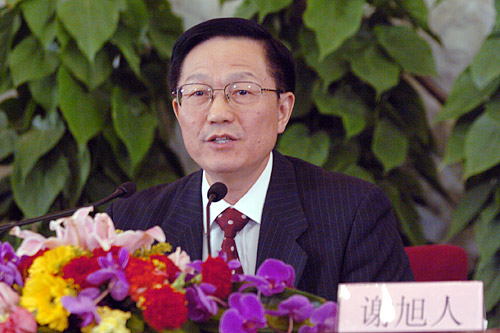China to Stick to Proactive Fiscal Policy in H2
Adjust font size:
The Chinese government has made clear on Thursday that it will continue its proactive fiscal policy in the second half of this year to maintain its economic growth as government leaders reiterated the stance, for there are still uncertainties ahead.
 |
|
Finance Minister Xie Xuren was seen in this file photo taken on March 6, 2008. [Gov.cn] |
The Chinese economy expanded 7.9 percent from a year ago in the second quarter of this year, driven by a surge of fixed-asset investment backed by government fiscal policies.
The economic growth rate accelerated from the 6.1 percent in the first quarter of this year and the 6.8 percent in the fourth quarter of last year.
To weather the global economic recession, the Chinese government unveiled a four-trillion-yuan stimulus package in November to revive the world's third largest economy, which was slowed by tumbling exports. The central government promised a 1.18trillion yuan investment.
By the end of June, 591.5 billion yuan (US$86.6 billion) out of the total investment from the central government had been allocated, which boosted a 33.5 percent jump of fixed-asset investment in the first half of this year. It was the highest level in the last five years.
The ministry's decision came as Chinese leaders vowed to continue the current policies.
Chinese President Hu Jintao said Thursday that China should adhere to its proactive fiscal policy and moderately easy monetary policy to ensure a stable economic growth as the recovery is not yet solid.
Premier Wen Jiabao has reiterated that the economy is in a crucial phase and rebounding. He pledged to maintain the current macroeconomic policies and fully implement its four-trillion yuan stimulus package.
Xie said the government will implement the fiscal policy "at full swing" in the second half of this year and speed up allocation of investment from government, which, Xie hoped, would stimulate private investment.
Yang Zhiyong, researcher of the Institute of Finance and Trade Economics at the Chinese Academy of Social Sciences, a government think tank, said that currently the proactive fiscal policy had a limited impact on pushing up private investment. It is hard for private investment to enter monopolistic sectors, he added.
Li Yining, an economist from the Peking University, said consumption should be spurred to fuel the growth momentum in the future as the current economic recovery was advanced mainly by investment. He suggested the proactive policy be further carried out to stimulate consumption and private investment in the following period.
Xie said in the second half the ministry will continue its policy of tax cuts to increase investment from enterprises and consumption.
The ministry also pledged to increase spending on people's livelihood. Investment in agriculture, social security, medical care, education, science and environmental protection climbed 33.9percent from a year earlier to 1.48 trillion yuan, according the ministry.
Analysts said the macroeconomic polices should also aim to adjust economic structure for the long term and to create new growth points.
Jia Kang, president of the Institute of Fiscal Science, Ministry of Finance, said the government resolves to step up adjustment of economic structure as the economy is back on track for recovery.
Xie said the fiscal policy in the second will support innovation and energy conservation and emission reduction to sustain the economic growth.
On July 21, the ministry started a pilot program to subsidize 50 percent of investment for solar power projects, a move to boost the solar industry as a new growth point for the country's economy.
Xie also urged to strengthen supervision over fiscal management and improve information transparency in the second half as fiscal expenditure in the second half faced great pressure. Wen Jiabao also described the country's fiscal situation as "severe."
The ministry said the country's fiscal revenue in the first six months fell 2.4 percent from a year ago to about 3.4 trillion yuan, while its fiscal expenditure rose 26.3 percent to 2.89 trillion yuan.
(Xinhua News Agency July 24, 2009)